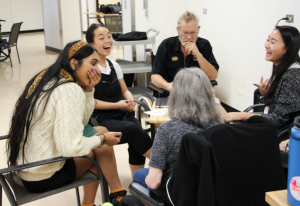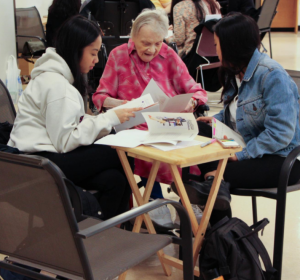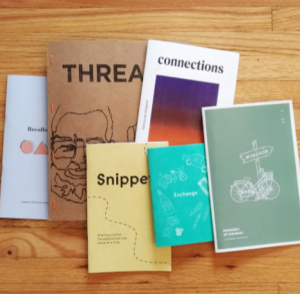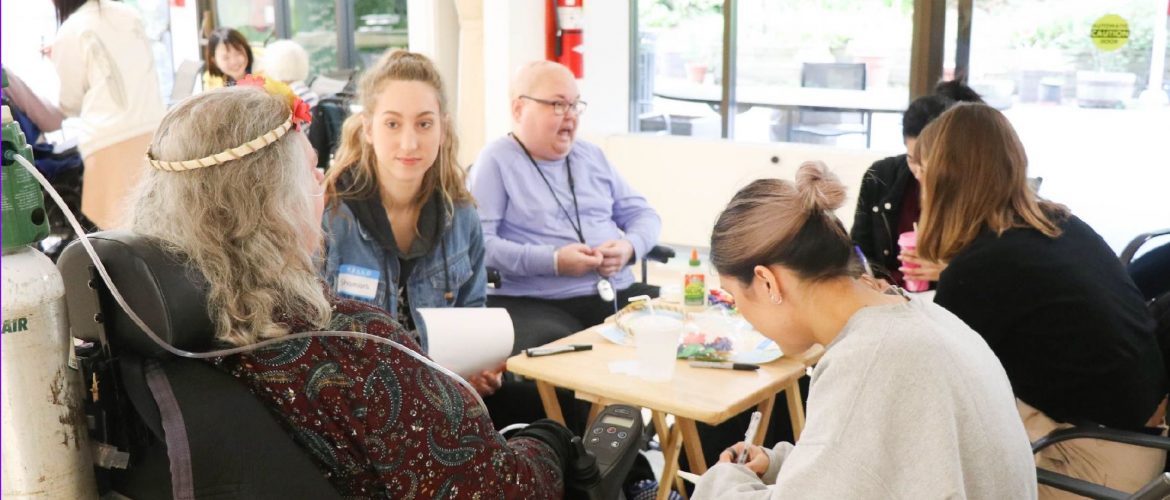Older adults living in long-term care facilities are at risk of experiencing social isolation and loneliness. These challenges are often associated with anxiety, depression and cognitive decline.[1] The Zeitgeist project, a social innovation bringing seniors and students together, is using the power of intergenerational storytelling to help change this narrative.
The project is the result of a collaboration between Vancouver Coastal Health Authority (VCH) and Emily Carr University (ECU). Through support from the Centre of Aging + Brain Health Innovation (CABHI), powered by Baycrest, research on the project’s effectiveness was conducted at Purdy Pavilion, a long-term care facility in Vancouver.
The objective of the project was twofold: to provide meaningful engagement for seniors at risk of social isolation, and to create a unique learning opportunity for communication and design students at ECU.

Students from Emily Carr University getting to know residents at Purdy Pavilion long-term care facility.
The first phase of the project allowed residents and students to get to know each other better. It was during this phase that the residents shared their stories about growing up, raising families, and transitioning into long-term care.
Donna Levi, project lead and recreational therapist at Purdy Pavilion, says this moment – the exchange of stories – was powerful enough on its own.
“The project helped boost the self-esteem of a lot of our residents,” she shares. “They were very proud to tell their stories, and proud that the students responded with such attentiveness.”
At the end of the sessions, the students worked with the resident to compile the stories into booklets residents could share with their family and friends. Some residents expressed a desire to leave their books as legacy gifts for their grandchildren. Levi notes that the booklets also helped staff provide more personalized care, especially when meeting residents for the first time.

Students and a resident creating a personalized booklet.
When asked how the project directly impacted them, many of the residents reported feeling relieved they had someone to talk to. “It made me feel less lonely,” says Reg, an 85-year old resident at Purdy. Another resident says the experience helped connect them with more people.
While the project helped residents engage with others and express themselves through storytelling, ECU students received the gift of perspective. Zeitgeist created a space for the residents to be seen – not for their needs, but for their unique experiences.
“It is always an enjoyable experience to exchange stories,” explains one of the student participants. “But to take it to the next level and create a publication, validates that these stories are important, valuable, and remembered.”
CABHI’s Spark program, designed to foster innovations from point-of-care health care workers, helped the Zeitgeist project fulfill its objectives to become an activity both the residents and students enjoyed doing together. Spark equips innovators with the tools they need to test and validate their ideas, so they can be transformed into real-life solutions. In addition to funding, innovators in the Spark program also receive access to CABHI services and expertise.
“CABHI gave us tremendous project support,” Levi says. “If we had any questions along the way, they were there to support.”
The Zeitgeist project continues to run at Purdy Pavilion under a new name: Perspectives.
Plans to expand to other long-term care facilities are also underway. With additional CABHI funding, a How-to Zeitgeist Guide is being created, which Levi hopes will help other care homes adopt the program.
“Other recreational therapists can’t wait for the guide to be completed so they can contact local universities and create their own programs on site,” she says.
With CABHI’s support, the Zeitgeist project is well on its way to helping older adults live more connected and socially active lives.

The personalized booklets helped residents relive their favourite memories.
Learn more about how we support innovations in aging and brain health, like the Zeitgeist project, through our Spark program.
[1] Government of Canada| https://www.canada.ca/en/national-seniors-council/programs/publications-reports/2014/social-isolation-seniors/page05.html


